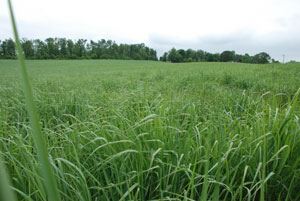Switchgrass For Fuel And Forage
June 18 Outdoor Event To Highlight Various Uses For The Native Grass
LENOIR CITY, TENN.
The University of Tennessee Center for Native Grasslands Management is hosting a field day highlighting the potential for switchgrass to be used as a fuel and as livestock forage. The event will be June 18 in Loudon County in East Tennessee.
Participants will visit a local farm to view the native grass “in action” and then visit the Wampler’s Farm Sausage facility in Lenoir City for sessions on legume intercropping and biochar field applications. Participants will also tour Wampler’s energy facilities, including the first installation in the world of a Proton Power CHyP System. The CHyP turns switchgrass/biomass into hydrogen energy. Wampler's Farm Sausage uses clean renewable energy to provide all of the facility’s base electrical needs. The company serves as a role model for the business community and nation with its efforts in energy independence, economic development and environmental stewardship.

Three key members of the UT Institute of Agriculture helped to coordinate the event: Pat Keyser, director of the UT Center for Native Grasslands Management; Fred Allen, coordinator of agronomic crop variety testing and demonstrations; and John Goddard, with UT Extension’s Loudon County Office. Keyser says those attending the field day will learn first-hand about switchgrass production and just how well the native grass can perform for livestock and as a fuel feedstock.
Keyser adds that switchgrass is very productive, very drought tolerant, and can grow on particularly wet sites. There are two basic types of switchgrass – upland and lowland, which is considerably taller. In terms of forage quality, Keyser says switchgrass can become stemmy, especially the lowland varieties, but it is readily grazed by cattle and produces summer gains of 1.5 – 2.0 lb/day on steers.
A breakfast biscuit, compliments of Wampler’s, will be served to all participants and lunch is provided as well; however, advance reservations are required. To register, contact your local county UT Extension agent no later than June 7.
Participants will assemble at 8 a.m. EDT at the Loudon County Visitors Bureau, 1075 Hwy 321, in Lenoir City. Transportation will be provided to the event sites. The event is expected to conclude around 1:30 p.m. ∆